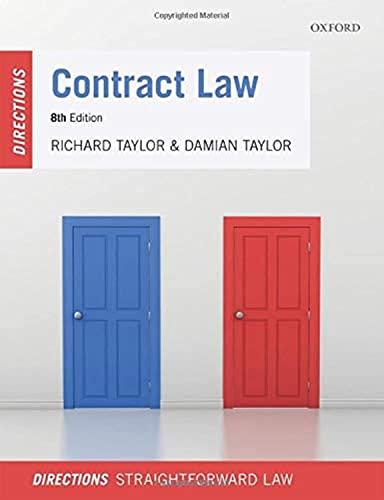Answered step by step
Verified Expert Solution
Question
1 Approved Answer
True or False Retaliation claims have become the most frequently filed charges before the EEOC. For an adverse employment action for the purpose of a
True or False
- Retaliation claims have become the most frequently filed charges before the EEOC.
- For an adverse employment action for the purpose of a Title VII retaliation claim, a plaintiff must show that a reasonable employee would have found the challenged action materially adverse, which in this context means it well might have dissuaded a reasonable worker from making or supporting a charge of discrimination.
- InBurlington Northern v. White, the Supreme Court held that retaliation in the workplace is prohibited while retaliation outside the workplace falls outside the scope of the anti-retaliation provision
- Burlington makes clear that actionable retaliation for protected activity need not involve a "tangible employment action" as defined inFaragher andEllerth. The Court thus rejected the view previously held by the Third Circuit that Section 704(a) reaches only "ultimate" employment decisions.
- InThompson v. North American Stainless, LP, the Supreme Court concluded that firing a close family member will almost always meet theBurlington standard, and inflicting a milder reprisal on a mere acquaintance will almost never do so.
- Proving causation is critical to establishing retaliation under 704(a), as it is to establishing discrimination under 703.
- The "opposition clause" of the retaliation provision of the Title VII does not protect an employee who "speaks out about discrimination not on her own initiative, but in answering questions during an employer's internal investigation."
- UnderCrawford an employee is protected from retaliation for opposing discrimination against other employees; in fact, courts were holding this way beforeCrawford.
- In certain situations, an employee's complaints can be so inimical to her employer's interest and so excessive as to be beyond the protection of section 704(a) even though her actions were generally associated with her complaints of illegal employer conduct.
- Hochstadt held that an employee's complaints regarding illegal employer conduct can go beyond the scope of section 704(a) protection when such conduct is aimed at achieving purely ulterior objectives, or for conduct aimed at achieving even proper objectives through the use of improper means.
- InHochstadt, the First Circuit held that courts are not permitted to apply the "rule of reason" in assessing whether a particular plaintiff went too far.
- Nothing in Title VII compels an employer to absolve and rehire one who has engaged in deliberate, unlawful activity against it.
- InWhirlpool Corp. v. Marshall, Secretary of Labor, the Supreme Court held that employees must rely exclusively on remedies expressly set forth in OSHA.
- TheWhirlpool Corp. employees were concerned that a particular machine at their manufacturing plant was a dangerous condition as it kept malfunctioning.
- The OSHA regulation, sustained in Whirlpool, creates a general right to walk off the job whenever workers suspect a safety hazard.
Step by Step Solution
There are 3 Steps involved in it
Step: 1

Get Instant Access to Expert-Tailored Solutions
See step-by-step solutions with expert insights and AI powered tools for academic success
Step: 2

Step: 3

Ace Your Homework with AI
Get the answers you need in no time with our AI-driven, step-by-step assistance
Get Started


